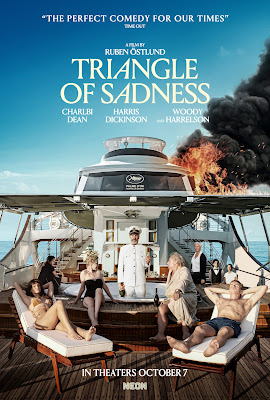I’m told that among fashion-forward folk, the “triangle of sadness” is the area between one’s eyebrows and the top of one’s nose bridge, the space in which wrinkles related to ageing and unhappiness tend to congregate. (Purveyors of Botox, of course, are delighted to help you rejuvenate yourself by plumping out this region.) I had never encountered the term “triangle of sadness” before watching a darkly comedic English-language film that carried off the Palme d’Or at last year’s Cannes Film Festival. Because the film opens with a line-up of buff male models all vying for a lucrative gig, it makes sense that the ominous “triangle of sadness” gets a quick mention. I should add that there are other possible meanings for the phrase as well. Since the main action unfolds on a luxury cruise ship whose voyage goes awry, it’s fair to think of the infamous, mysterious Bermuda Triangle, the graveyard of many a sea-going vessel. And the film contains, if you look at it geometrically, a perverse sort of love-triangle as well.
I had vaguely heard of Triangle of Sadness when it was first released, but last week’s 2023 Oscar nominations made me sit up and pay attention. Not only is this small film in the running for Best Picture (along with Avatar 2, The Fabelmans, and Everything Everywhere All at Once) but its Swedish director, Ruben Östlund, is one of only 6 candidates for Best Director, in the august company of Steven Spielberg (The Fabelmans), Martin McDonagh (The Banshees of Inisherin), Todd Field (Tár), and the two Daniels whose teeming brains concocted Everything Everywhere. Östlund is also up against the same men (yes, they’re all men) in the tough original-screenplay category. Clearly, some Academy members were extremely impressed.
I’m not sure whether it’s just coincidental, but the shipwreck aspect of Triangle of Sadness reminds me a lot of a popular 1902 stage play by none other than J. M. Barrie, author of Peter Pan. It’s been a long while since I read The Admirable Crichton, but the gist of Barrie’s comedy is that is that when some very upper-crust Britishers are stranded on a tropical island, the one traveler with some practical skills upends the traditional social hierarchy and becomes the man in charge. There’s a mild social message here, and a considerably tougher one in Triangle of Sadness, in which an American ship’s captain with Marxist leanings (Woody Harrelson, as you’ve never before seen him) debates political theory with a wealthy Russian oligarch while a storm rages outside. It’s all meant to seem absurdist in the extreme: while the hard-working crew members desperately strive to keep the posh passengers happy and safe, Harrelson’s captain remains focused on his political rejection of the opulent lifestyles all around him.
I don’t think it’s accidental: “Screw the rich” seems to have become a major theme in recent years. In addition to Triangle of Sadness, see also Knives Out, Glass Onion, and elements of Elvis, Blonde, and She Said.. Then there are, of course, both seasons of TV’s White Lotus, in which the wealthy and entitled show up at a super-exclusive resort, and bad behavior ensues. Truth be told, we like to be persuaded, as F. Scott Fitzgerald would have it, that the rich are very different from you and me. But—as someone close to me has pointed out—without the ultra- rich you can’t make movies. For the deep-pockets financiers behind these projects, in which the very wealthy are confirmed to be selfish and cruel, is this a matter of self-flagellation? Somehow I think not.








No comments:
Post a Comment